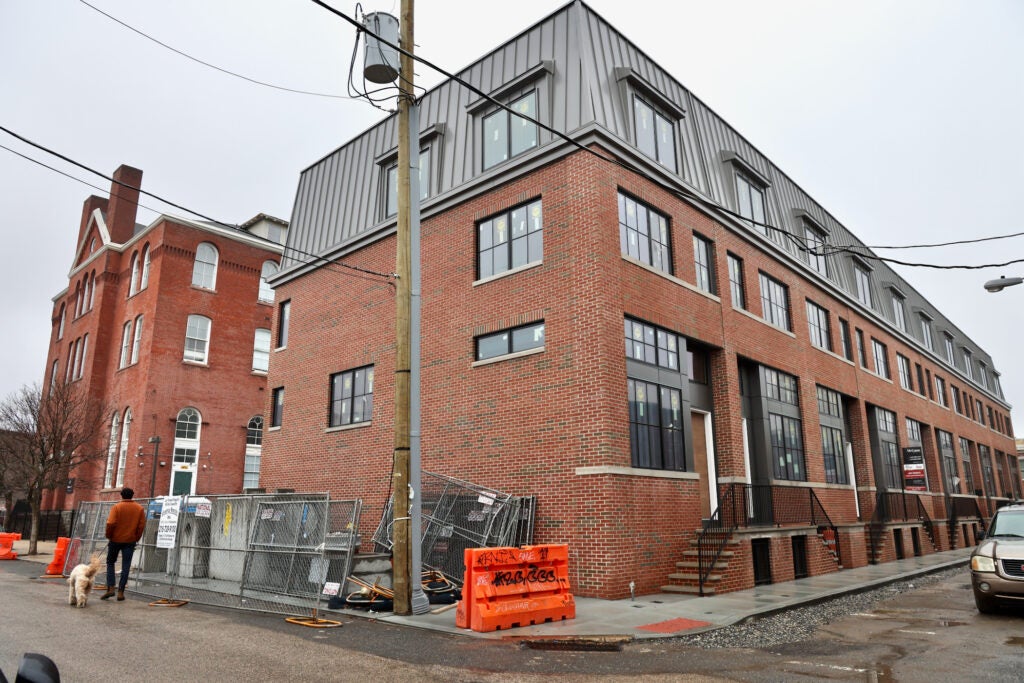[ad_1]
In addition, a provision of the covenant, a legally binding document, requires the owners to allow tenants to remain in their units for another three years at the same rate.
After that, Ingerman would no longer be obligated to keep the development affordable.
While a judge may find the restrictions only apply to the building, affordable housing advocates argue the restrictive covenant applies to the entire St. Anthony’s development — the building, the grounds and the parking lot where 10 luxury townhomes now sit. That would mean Ingerman jumped the gun by about seven years.
Dina Schlossberg, executive director of Regional Housing Legal Services, called building the townhomes a “gross violation” of the covenant. And she’s concerned Ingerman’s actions could deepen Philadelphia’s affordable housing crisis if the PHFA elects not to enforce the terms of the indenture.
PHFA is the only entity with the ability to take action against Ingerman, though impacted residents could sue privately.
“This is a bellwether for the city,” said Schlossberg. “If he doesn’t have to [comply with the restrictive covenant] then why do others have to?”
Schlossberg said her organization has never seen a property owner use a portion of a site covered by a tax credit transaction to build a market-rate development — without first getting consent from PHFA.
CEO Brad Ingerman said his company never needed permission from PHFA to move forward with construction. The restrictive covenant, he said, only applies to the apartments at both sites, meaning the luxury townhomes don’t violate the agreement.
If the opposite were true, he said, red flags would have gone up.
“We not only had the title companies that were ensuring title for owners of these homes take the position that there was no restriction that applied to the land, but we also had two different lenders and two different lawyers representing those lenders that took a similar position that the land was not subject to any restrictive covenant,” said Ingerman.

Maximizing profits?
In November, City Councilmember Kenyatta Johnson penned a letter to the executive director of PHFA. The document, obtained by WHYY News, details the circumstances at St. Anthony’s — now called Birchwood at Grays Ferry. It also covers concerns the veteran lawmaker had with a separate luxury development on the grounds of Artist Village, another affordable housing project the city chose Ingerman to develop in Graduate Hospital in the 1990s.
“Such blatant disregard of the terms of a legal contract deserves an equally strong response from PHFA that makes whole the tenants of these projects and captures these ill-gotten gains to support affordable housing in the immediate neighborhood, where affordable options are in short supply,” wrote Johnson, whose district includes St. Anthony’s and Artist Village.
Artist Village sits near the corner of 17th and Bainbridge streets, less than a mile away from St. Anthony’s. It consists of two buildings with a total of 36 units. And like St. Anthony’s, the project received Low-Income Housing Tax Credits that prompted a nearly identical restrictive covenant from PHFA, which also refers to the development as the “project.”
In this case, the covenant expires in 2028.
Ingerman is building 14 new townhomes on the site, replacing an entire parking lot and open space part of the site. The townhomes are being marketed for nearly $2 million. The development also includes a new 20-unit building that is physically attached to one of the affordable ones.
Ingerman obtained building permits for both sets of townhomes before the end of December 2021, according to city documents. The timing is significant. Any building permits dated after that deadline were automatically subject to a new iteration of the city’s controversial tax abatement program that requires property owners to pay more to the city over the first 10 years.
Under the latest version of the program, the value of the abatement gradually reduces over time. Before now, the abatement enabled developers and homeowners to avoid paying taxes on any new or rehabbed property for 10 years.
In his letter, Johnson said Ingerman moved forward with the developments when the company did in order to maximize his profits.
Veteran zoning attorney Darwin Beauvais said the restrictive covenants in place for St. Anthony’s and Artist Village would not have stopped Ingerman from obtaining building permits.
“If an application is submitted for a zoning permit or a building permit, and the application follows what’s required under the code, a permit will be generated, unbeknownst to any other policy issue. This is not to take away from [Licenses and Inspections], it’s just that that’s what our permitting office is made to do,” Beauvais said.
[ad_2]
Source link



